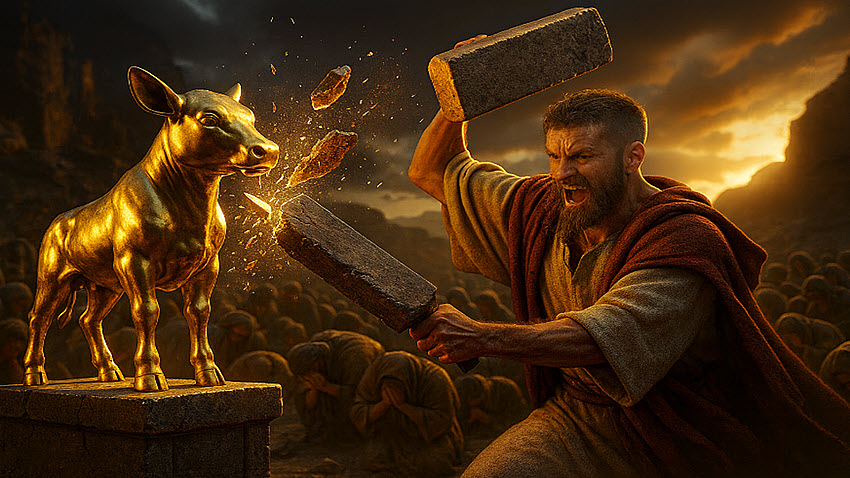“Image worship is unbiblical” – “jesus is not the original wording”
Marcin Majewski is a professor specializing in biblical text research. He frequently speaks on Biblical topics as an expert on YouTube channels. He represents Catholic views.
I was intrigued by one of his interviews because he specifically addresses the fundamental principles of faith.
Let’s see what Mr. Majewski discovered in the Bible regarding:
1. praying to images – from the 37th minute,
2. the name of Christ – from 01:03:11.
The interview is in Polish but you can watch it by turning on subtitles on YouTube, and choosing ‘English’.
Here’s the full interview:
https://www.youtube.com/watch?v=vt_2iyJXj9s&t=2493s
Praying to Images
Mr. Majewski discovered in the Bible:
„The Ten Commandments unequivocally forbid the making of any sculptures, likenesses, or figures.”
„In Christianity, certain elements have become such folklore, such an aberration, that from the perspective of the Old Testament, this worship of images is iconoclastic, even unbiblical.”
Is he right?
Personally, I disagree with Mr. Majewski’s flexible approach to the principles of faith—that God speaks differently, but… and here he justifies the lies of religion…
But on these two topics I’m writing about, Mr. Majewski’s discoveries are interesting. God doesn’t want to be sculpted or painted by people. Do you think, dear Reader, that this sculptor or painter saw God?
If not, then who is he painting, carving, or creating?
Someone might say that we have the shroud of turin. Thanks to that, we know what Christ looked like.
In reality, we don’t. The shroud of turin is supposed to depict a man with long hair. Christ did not have long hair:
https://jesu.pl/was-christ-a-nazirite-a-nazorean/
If we don’t know what the Father and the Son looked like, how can we paint or sculpt the most important Figures in the universe?
Someone once created an image of the Son, and artists and craftsmen then copied it.
God speaks clearly on the subject of images in both the Old and New Testaments.
Here are examples:
„See, I am giving you the land. Go, possess it… See, you shall not make for yourself a carved image or any likeness… You shall not bow down to them or serve them” – Deuteronomy 5:8–9.
„They threw their gods into the fire, for they were no gods, but the work of men’s hands, wood and stone, and they consumed them” – Isaiah 37:19.
„Claiming to be wise, they became fools. They exchanged the glory of the everlasting God for images like corruptible man, birds, four-footed beasts, and creeping things” – Romans 1:22-23 (ESV).
Interestingly, if we read these 22 verses:
https://jesu.pl/is-it-allowed-to-pray-to-god-through-images-crosses-and-figurines/
Then, if we analyze them, we’ll come to some interesting conclusions:
1 – God treats the figures in paintings as deities to whom people bow.
2 – Even when people call these figures in paintings: God, God the Father, Christ, to God they are deities of unknown appearance:
“And the rest of the men, which were not killed by these plagues, repented not of the works of their hands, so as not to worship demons, and idols of gold, and silver, and brass, and stone, and wood: which cannot see, nor hear, nor walk.” – Revelation 9:20.
3 – When the Israelites made a calf and prayed to God through it, God didn’t approve. He considered it idolatry. And look what will happen to idolaters, worshipers of images and statues:
“Blessed are those who wash their robes, that they may have right to the tree of life and may enter through the gates into the city. Outside are the dogs and the pharmacists and the sexually immoral and the murderers and the idolaters, and whoever loves and practices lying” – Revelation 22:14-15.
4 – If God forbids the use of images for prayer, why do so many religions and so many people work against God?
Christ’s Name
Let’s see what Professor Marcin Majewski discovered on the topic: what is Christ’s real name?
(Quick side note: the name of Christ is written as “Yesu/Yeshu” in Greek and Hebrew. However in English we write it as “Jeshu/Jesu” in order to pronounce and call on the correct name of the Christ. This is why you will often see me writing Jesu/Yesu, etc. n the article.)
The biblical scholar says:
„We have the Hebrew name Joshua, an abbreviation of the full form Yehoshua, meaning God saves…
We have Yeshua and Yesu/Jesu, the Greek adds the letter „s” to many names. They added Jesus to Jesu. Jesus is not the original spelling.”
Mr. Majewski discovered Christ’s name: Jesu, but he continues to use jesus, unnecessarily propagating biblical lies…
The original Greek name is: Jesu/Yesu. Some people pronounce this name as Jesus. This is an error. The letter „s” at the end of the name was added in Greek. Therefore, it is a Greek rule. It is not a Polish or English rule.
Therefore, we do not use the Greek form: Jesus. It would be like someone trying to translate the English name Thomas into their own language. They would use the basic form Thomas. They would not use the English variants: Thomas’, of Thomas, etc.And here we agree with Mr. Marcin Majewski. The Greek form of the name is: Jesu/Yesu. We should adapt this name to English anyway. This name is not: Jesus.
However, we disagree with the Hebrew form:
https://jesu.pl/why-are-there-so-many-problems-with-the-name-of-christ/
Mr. Majewski claims it is: Joshua, Jeshua.
We claim that in Hebrew, Christ was called: Yeshu. This is the same name for Christ as in Greek: Yesu/Jesu. There was no „sh” in Greek at that time, so when translating from Hebrew: Yeshu to Greek: Jesu/Yesu, the „sh” was replaced with the letter „s.” However, they could pronounce it the same way as in Hebrew: Yeshu. So they wrote: Jesu/Yesu in Greek, but pronounced: Yeshu. Of course, some could pronounce: Yeshu, Jesu, and others: Yeshu.
Why wasn’t Christ called: Jeshua/Yeshua in Hebrew?
If the form „Jeshua” was correct, then biblical scholars would have translated the Hebrew form „Jeshua” to „Jesu-a.” After all, the letter „a” was in the Greek alphabet. There was no „sh,” but there was an „a.” If they transferred this name to the form „Jesu,” then in Hebrew it must have been „eshu.”
Why did the Hebrew and Greek names have to be pronounced the same or similarly?
None of God’s saints, none of Christ’s true servants, would allow themselves to distort this name or replace it with another. They had no right to do so.
It was God the Father who gave Christ His name, and no one has the right to change it. God’s servants, saints, knew and know this:
“Therefore God has highly exalted Him and bestowed on Him the name that is above every name, that at the name of Yeshu every knee should bow, of those in heaven and on earth and under the earth, and every tongue confess that Yeshu Christ is Lord, to the Glory of God the Father” – Philippians 2:9-11.
That’s why in Greek we have the written form: Yesu, and in Hebrew: Yeshu. The difference is in spelling; the pronunciation could be the same in both languages: Yeshu, Yesu.
God informs us that this name is very important. We have about 65 verses that speak of it.
It turns out that faith in Christ Himself is very important. Faith in Christ’s teachings is very important. But faith in the name is also important. It is through the proper name of Christ that we have: forgiveness of sins, immersion, prayers, salvation.
Let’s see.
Faith in the name of Christ:
“And this is His commandment, that we should believe in the name of His Son, Yeshu Christ, and love one another, just as He has commanded us” – 1 John 3:23 (Millennial).
„He who believes in Him is not condemned (judged); but he who does not believe stands condemned (judged) already, because he has not believed in the Name of the Only begotten Son of God” – John 3:18.
Forgiveness of sins in the name of Christ:
“I am writing to you, little children, because your sins have been forgiven for His name’s sake” – 1 John 2:12.
“To Him all the prophets testify, that whoever believes in Him receives forgiveness of sins through His name” – Acts 10:43.
Salvation in the name of Christ:
“And she will bear a son, and you shall call His name Yeshu, for He will save His people from their sins” – Matthew 1:21.
“And there is salvation in no one else: for there is no other Name (singular form) under heaven given among men, by which we must be saved” – Acts 4:12 (Millennial).
Immersion in the name of Christ:
„And Peter said unto them, Repent, and be immersed, every one of you, in the name of Yeshu Christ for the forgiveness of your sins; and ye shall receive the gift of the Holy Spirit” – Acts 2:38.
“But when they believed Philip, as he preached the good news of the Kingdom of God and the name of Yeshu Christ, they were immersed, both men and women” – Acts 8:12.
Therefore, every true believer, a true servant of Christ, should fight for the faith once delivered to the apostles/saints and for the true name of Christ. This is our duty and the path to happiness, salvation, and eternal life.
















Zapraszam do komentowania, wyrażania swojej opinii: